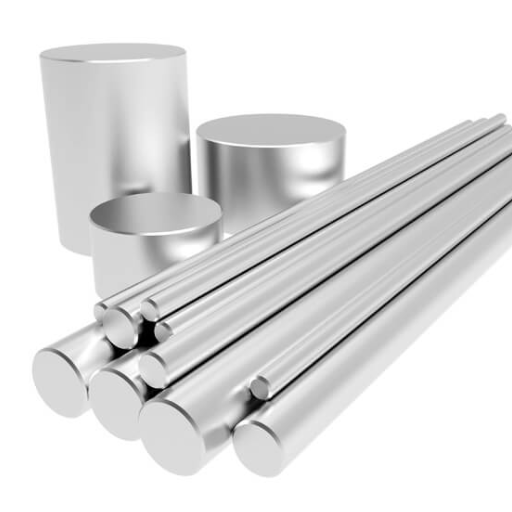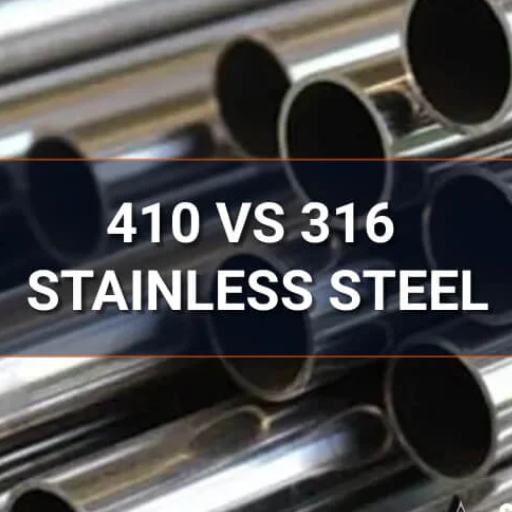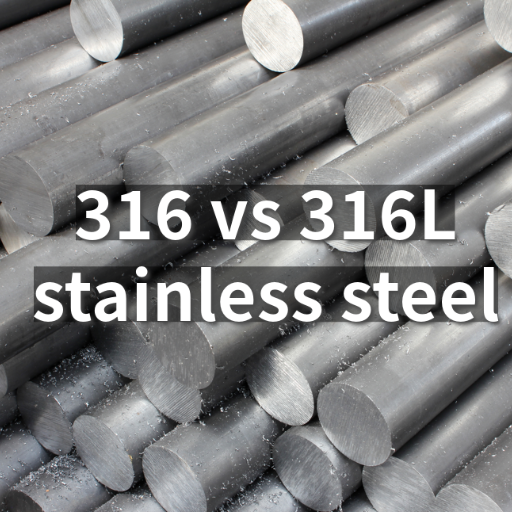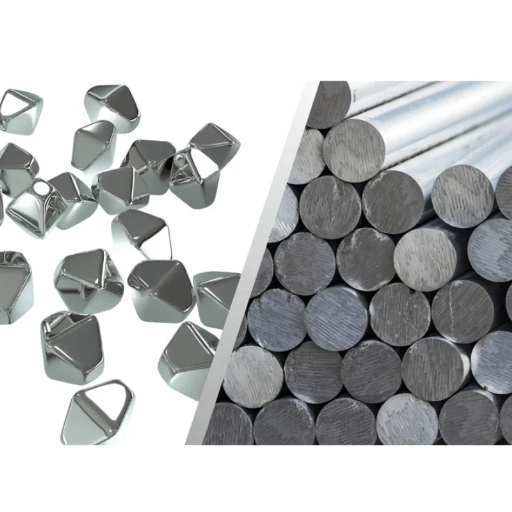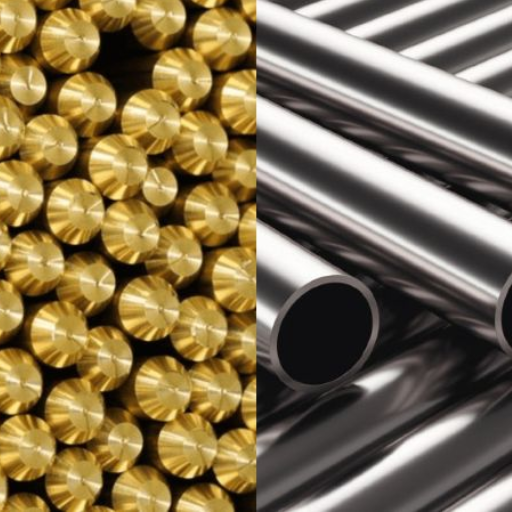Selecting either of titanium or stainless steel is not a linear process that should be determined by any simple dichotomy. Both of them are examples of very special materials with regard to performance, such as in the case of aeronautical structures, human-body parts, coatings, and more. But with the two, there are also considerable differences in terms of all aspects; strength to weight ratio, what they cost to work with, and where. Below is a more specific discussion that will clarify these differences, advantages and disadvantages between the two materials hence helping you serve your purpose. Whether you are an expert involved in selecting materials for a project or an inquisitive consumer yearning to know about the composition of these metals, this discussion is for you. You will learn about such critical aspects in greater detail.
Understanding the Basics of Titanium and Stainless Steel
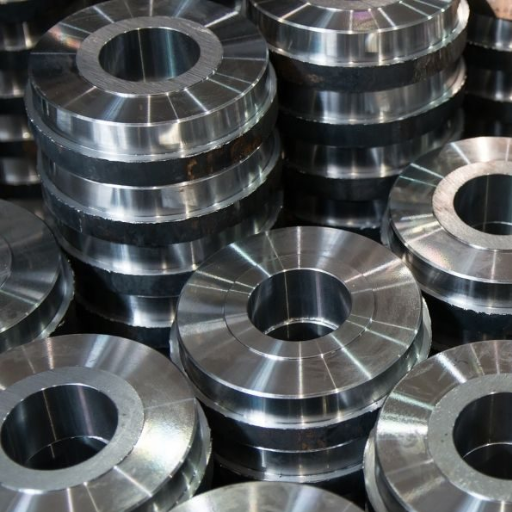
Both titanium and stainless steel are common materials to use because they are strong, don’t corrode easily, and do not wear down with use. They are, however, quite different in their compositions and characteristics. For example, titanium is a very light metal yet has high strength, which makes it more suitable for weight reduction applications such as those found in the aerospace and medical fields. It is also almost entirely immune to corrosion even under extremely harsh conditions. On the other hand, stainless steel, which is an iron alloy with added carbon and chromium elements, is heavier, but it is excellent in resisting wear and impact. It offers very good corrosion resistance in cases such as that of the 304 and 316 grades and finds application in many areas, such as constructing buildings, tools, or household materials.
What is Titanium?
Representing the chemical bend of period 4 elements in the periodic table, Titanium has one of the highest corrosion resistance and biological compatibility despite its lightweight attribute. Although it falls under the category of metals, its density-to-yield strength ratio is very small; hence, it is popular among various industries such as the aerospace, medical, and maritime sectors. Titanium is also naturally resistant to corrosion in the form of an oxide layer which forms within its surface when exposed to air and also in more aggressive environments such as seawater and acidic environments. In the case of titanium alloys such as Ti-6Al-4V, there is a strong combination of strength and strain tolerance and the ability to withstand high temperatures, hence the use of these alloys in such environments. Titanium is also non-cytotoxic, which is why it is heavily employed in implants, prosthetics, and other medical equipment. However, notwithstanding its merits, titanium is one of those metals that costs more to manufacture as compared to other metallic forms because it requires a highly complicated method of extraction and processing. Nonetheless, the properties and Other performance characteristics of titanium are important in many advanced engineering applications.
What is Stainless Steel?
Stainless steel is a type of steel that resists corrosion, composed mainly of iron with at least ten percent chromium content. Chromium addition is very essential because it self-generates a protective layer on top of the metal steel, which contains an oxide of itself, and this protects against any coating of rust or any deterioration, even in very aggressive conditions. Other elements such as nickel, molybdenum, manganese, and nitrogen may also be added to the alloy to further improve the properties such as strength, toughness, or resistance to pitting and high temperatures.
On the other hand, one of the widely consumed metals is stainless steel, used in building construction, its alloys serving the energy and automobile sector, and in the food industry. Austenitic stainless steels, including type 304 and 316 stainless steel, should be mentioned separately for their extensive application in such environments as moist and/or acidic and yet their corrosion resistance as well as weldability are also potential attributes. Despite the mentioned applications, there are limitations to the application of austenitic stainless steel, for example, its dependence on the presence of Mo and sulfur in some cases limits its use in the chemical and pulp and paper industry. On the contrary, chi-steel is less likely to be damaged than chi-steel in terms of localized corrosion when using martensitic stainless steels. The indefinitely beneficial feature of stainless steel is its ability to recycle, and that is one more factor in the selection of stainless steel in manufacturing processes and construction activities.
Key Differences Between Titanium and Stainless Steel
|
Key Parameter |
Titanium |
Stainless Steel |
|---|---|---|
|
Density |
Lightweight |
Heavier than titanium |
|
Strength-to-Weight Ratio |
High |
Moderate |
|
Corrosion Resistance |
Excellent in most environments |
Exceptional in acidic/moist areas |
|
Thermal Conductivity |
Lower than stainless steel |
Higher than titanium |
|
Melting Point |
1,668°C (3,034°F) |
1,400–1,530°C (2,552–2,786°F) |
|
Cost |
More expensive |
Generally less expensive |
|
Weldability |
Moderate (requires specific methods) |
High |
|
Stress-Corrosion Cracking |
Better resistance |
Vulnerable in chloride-rich settings |
|
Strength |
Comparable to high-strength steel |
High but lower than titanium |
|
Machinability |
Hard to machine |
Easier to machine |
|
Biocompatibility |
Superior (ideal for implants) |
Moderate |
|
Magnetic Properties |
Non-magnetic |
May be magnetic |
|
Sustainability |
Biocompatible and recyclable |
Recyclable |
Physical and Chemical Properties
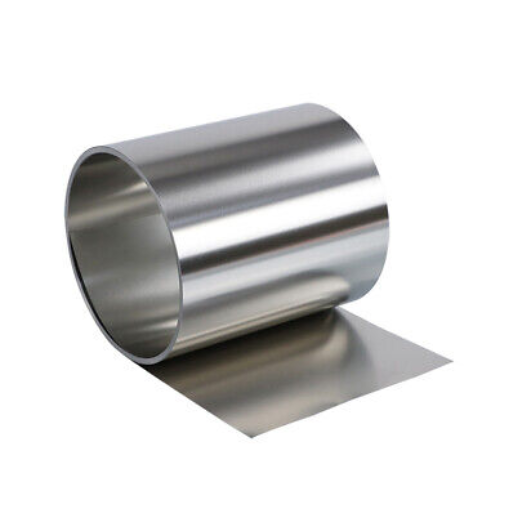
Stainless steel is roughly twice as dense as titanium. Its density falls between 7.5 and 8 g/cm³, depending on the specifications, whereas titanium has a density of approximately 4.5 g/cm³. Titanium itself is known to have a better strength-to-weight ratio than is necessary for ASTM B348 bars, which presents as favorable for individuals in need of low, yet strong materials. Chemically, titanium has almost no tendency toward corrosion since even in aggressive environments such as seawater or acid, it is stable due to oxide layer formation. On the contrary, stainless steel is regarded highly for its variety of grades that can alloy almost anything in terms of strength and corrosion resistance, though they remain relatively cheap. Temperature fluctuation and exposure to severe environments have enhanced corrosion of stainless steel more than titanium by far.
Density and Weight Comparison
One of the primary distinctions between titanium and stainless steel can be understood through their density and weight, which affects where these materials are applied. For example, for coring stainless steel, the density ranges from 7.5 – 8.0 g/cm³, depending on the alloy type used, whereas titanium density is roughly 4.5 g/cm³. This large difference in weight provides several advantages of titanium for applications like aerospace and automobile industries, where the component weight is significantly attributed. On the other hand, stainless steel planes have lightweight, which makes them more preferable when there is a performance and cost strength ratio with respect to the application. Titanium has qualified usage in weight-conscious designs, especially for high-performance engineering structures and elements, due to its lightweight.
Corrosion Resistance: Titanium vs Stainless Steel
Titanium exhibits good performance against corrosion, particularly in areas where the danger of exposure to highly corrosive materials such as chlorides or seawater is high [5]. The main provision of relevance for the oxidative resistance of titanium alloys is the formation of an oxide layer that covers the surface of these elements. This coating restricts the oxidation of these substances and their potential exposure to other chemical contaminants. Thus, titanium is extensively utilized in environments where abrupt corrosion is expected, such as applications in the food processing industries, water-cooled reactors for power plants, and bio-medicine.
Stainless steel also possesses a lot of resistance to corrosion, although it varies widely based on the grade and composition of the steel. For example, austenitic grades such as 316L stainless steel are also very resistant to corrosion in many environments because of the inclusion of more chromium and molybdenum in them. On the other hand, in worse situations, such as continuous exposure to seawater or crevice corrosion, stainless steel performance may be poorer than that of titanium. The choice of these substances, however, usually depends on the particular service environment and the permissible working of the equipment to defects over time.
Applications of Titanium and Stainless Steel
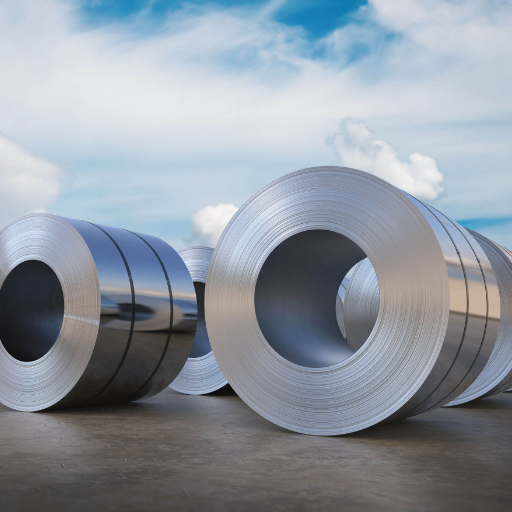
- Marine Industry
Another highly relevant utilization of marine-grade steel includes structures within swimming tanks and swimming pools, given the existence of corrosion from the buildup of moist salt. Some of the maritime industry sectors have a substantial expenditure on repair and replacement of facilities due to corrosion. Research reports indicate that there was a demand for marine-grade stainless steel of about $4.5 billion in the year 2022.
- Aerospace and Aviation
The demand for grade 316L stainless steel and titanium in several aeronautical applications cannot be overstated. The two are commonly used in building and maintenance of aircraft including gears and exterior exhaust systems. Titanium is particularly favored because it is of low weight; thus, lowering the average weight of the plane without lowering the strength of the material. Statistics show that titanium makes up rather about 40% in terms of weight in the airframe design of large commercial aircraft because of its properties.
- Chemical and Petrochemical Processing
Moreover, devices like heat exchangers, storage tanks, and the piping systems in chemical plants mostly use the -316 L steel as they have the capacity to bear chemical attacks to some extent, such as acids and chlorides. However, in aggressive environments where there are great chances of corrosion, a 316L stainless steel is less preferred as it can undergo crevice corrosion more than titanium. According to market reviews, the world market for anticorrosion materials in chemical production is worth $27 billion in 2021.
- Medical and Healthcare
In terms of applications, titanium completely optimizes implants such as surgical, dental and orthopedic implants and so on. It is one of the reasons why 316L stainless steel is used to make MRI compatible instruments. According to the studies outcomes, the bone-implants rate for titanium is over 90% thanks to its great osseointegration results.
- Energy Sector
The energy industry is among the main users of these two materials in the targeted sector. Steel materials find their application in the energy industry by the construction of nuclear reactors, solar panels, and geothermal plants, whereas titanium is more frequently referred to in the context of manufacturing heat exchangers, hydrosphere-compensating equipment, and power plants facing seawater. This has been more apparent as titanium is cited as more than half of the materials used in the condenser of desalination plants, projects that fall under the energy sector.
- Consumer Goods
Titanium is known for its weight and attractive designs, which is why it is popular in eyewear, electronic gadgets and high-class watches, while steel is mostly applied to interior products like fridges, tableware and sets of door fittings for obvious reasons, that is, cost and attractiveness. A Research of the Market Carried Out In 2023 Shows that almost 75% of all components of consumer goods manufactured in the world are attributed to stainless steel.
Construction: Structural Components and Fasteners
Providing structural components and fasteners where fail-safe operation is of vital importance, particularly to construction engineering as a whole, both titanium and stainless steel are indispensable from the above point of view. Such tension, in which the new trend for titanium is strong and the titanium has high strength and lightness and is able to withstand several environmental influences, such as an aggressive environment, especially in products such as pedestrian bridges and offshore platforms. Even other applications require high tensile strength in the fasteners used, as demonstrated again in the reports provided by regions where the demand is high and reinforcement is the enhancement of construction in these countries. Its application in light construction reached peaks as its demand in bridging and high-performance structures is never-ending. This is a function of the inherent properties contained in both smart materials, which will continue to grow as technology in construction advances, with each function of the material receiving an enhancement.
Stainless steel has been an attractive option for producing consumer goods because of the durability of the product, the external beauty of the material, and the ability of this metal to resist corrosion; this metal is especially indispensable for high-durability objects such as watches and cooking equipment. The hunger for the global kitchenware market is expected to grow, with the maximum share of the growth being in steel flatware and cookware due to their durability and cleanliness observed qualities. In the same vein, luxury watches usually come with stainless steel casing and adjustable straps owing to their elegant appearance and efficient undertakings even in the most challenging of weather conditions. The markets say that steel is increasingly being used in these sectors because people have a bias towards substitute products that can be used for a period without being damaging to the environment.
Consumer Products: Watches and Kitchenware
Benefits and Drawbacks
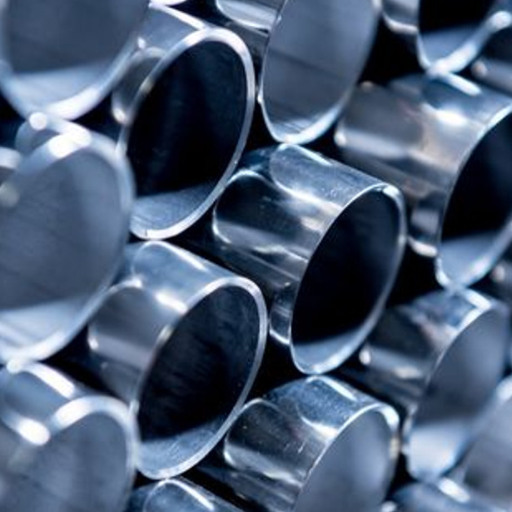
Outstanding levels of durability, resistance to corrosion, and adaptability make stainless steel an appropriate resource for the different areas where quality materials are highly desired. High wear resistance and longevity are other advantages of stainless steel, which does not require constant alterations, and this is yet another method of improving the cost-efficiency. Furthermore, this material supports environmental causes as it can be easily reused and this is the pattern that environmentally friendly people, and those who concern about environmental issues, would count as an effort done to achieve sustainability. While the appeal of the material for use in the industries as a design element is well understood, there are other features of stainless steel that make it popular even in consumerism.
It has its advantages, alright, but at the same time, there are certain reasons to limit the use of stainless steel. It is more expensive to manufacture stainless steel when compared to a number of alternatives and thus could act as a deterrent, particularly in low-budget projects. Apart from that, stainless steel also requires a large amount of energy in the manufacturing processes, and this raises concerns on issues about the use of stainless steel in the market. Moreover, its relatively high weight can limit use in most industries, such as aerospace technology that requires lightweight materials, or even in the production of some consumer goods that are easily carried around.
Advantages of Titanium
- Superior Strength-to-Weight Ratio
Titanium is known for its great combination of strength and lightness. It is strong like a lot of steels, but its weight is approximately 40-45% less, providing a great advantage in applications where weight is a major constraint such as aviation, motor vehicles, and sports goods.
- Corrosion Resistance
Titanium does not corrode under the most severe atmospheric exposure conditions. This is because it effortlessly develops a passive oxide film on its surface, which wards off rusting salt water and many chemicals. These properties make titanium one of the best candidates for the equipment made for marine, chemical, and healthcare purposes.
- Biocompatibility
Titanium atoms do not react with the tissue of the human body, that is, the human body is well tolerated to titanium. This feature provides it with elite status in medical equipment; its use is indispensable to manufacture of surgical implants, prostheses, orthoses, dental constructions and the like.
- High Melting Point
The boiling point of titanium is so low that it can be applied successfully even in heats of utmost reticence. Another example pertinent to high temperature applications is the use of titanium in jet engines and other static industrial heaters that are exposed to a very high temperature environment.
- Low Thermal Expansion
In comparison to other metals, the coefficient of thermal expansion of titanium is low. This is a big advantage as it allows maintaining the size of a given part even when the temperature changes which must be adhered to in precision endeavors.
Advantages of Stainless Steel
- Corrosion Resistance
Stainless steel is associated with the capability of resisting corrosion. The presented chromium percentages of 10.5% to 30% are capable of triggering the formation of the rather difficult cleaning passive oxide film on the surface of the stainless steel. Therefore, over the years, stainless steel has found use in harsh environments like marine, chemical, and people eat a lot of that kind of food or go to hospital care industries.
- Strength and Durability
The melding of ductility enables stainless steel to combine advanced tensile strength and elongation (ductility) for maximum utilization. For instance, Type 304 stainless steel has a yield stress of about 621 MPa (90Ksi). Owing to this ability, it is useful in infrastructure construction, constructing machines, and industries where standard construction materials are not an option.
- Hygienic Properties
Unlike other materials, stainless steel possesses a very smooth and non-porous surface that makes it highly resistant to contamination by bacteria. These are the properties due to which they are most often used in the foodstuff, medical, and pharmaceutical industries that are evolving stringent cleanliness standards.
- Temperature Resistance
Stainless steel is extremely suitable for operation at both the high and low temperatures. Whereas, Type 310 stainless steel can be used at a temperature of 1150°C (2100°F) maintaining its mechanical properties and certain figure of the austenitic grades will maintain their strength even under cryogenic temperatures.
- Recyclability and Sustainability
Common Drawbacks of Each Material
- Stainless Steel
- Higher Material Costs: Stainless steel, containing all the expensive nickel, chromium and other elements incorporated in the steel alloy is more expensive when compared to carbon steel and aluminum. The cost of stainless steel in the market, in general, can rise to as much as five times that of mild or carbon steel per ton.
- Work Hardening: When there are machining or forming of any kind, especially turn machining, martensitic stainless steel readily hardens and so this process increases the overall stress that the material can take and so does the cost of processing of the material.
- Thermal Conductivity: Stainless steel has relatively low thermal conductivity (approximately 16 W/m·K for Austenitic grade; whereas in carbon steel, it is around 50 W/m·K), making it less suitable for use in many heat transfer applications.
- Titanium
- High Production Costs: Among the many problems is the production of titanium, which is a very expensive metal to make and industrialize as the prices of it go can go for many times any other of its equal due to the energy cost of producing it.
- Gallium Formation Issues: Titanium is known to be an occurrence with the formation of galling which is defined as the undesired phenomenon in two contacting surfaces causing them to have severe wear and excessive energy consumption in the mechanisms.
- Limited Availability: The niches where titanium is used, as well as its complex production methods, meaning that in many regions, the output of the metal is limited which can create demand obstacles such as in aerospace.
About Environmental Considerations
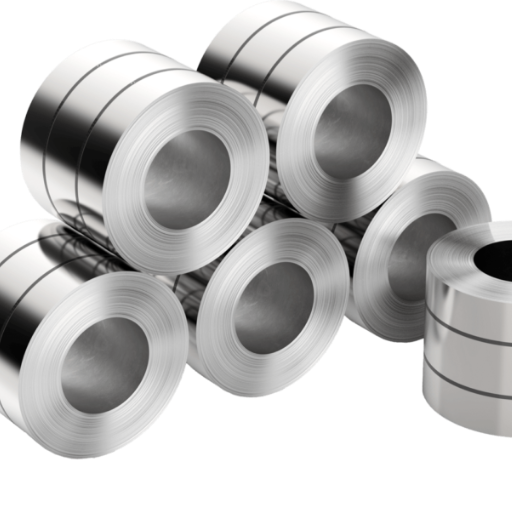
First, the quest for abundant and pure titanium makes the environment the most affected, owing to the rigorous extraction and refining processes that use a lot of energy. Also, all types of titanium ores like ilmenite and rutile are mined and dug out, which causes siltation of waterways and even deforestation. Primarily, these energy-consuming methods of recovery and refining of titanium from its ores, often with the assistance of the Kroll process, enhance the generation of carbon dioxide to the atmosphere. Conversely, this metal has tremendous resistance to corrosion and mechanical strength and hence the increase of the life of products and the emergence of the need to find materials in the aerospace or construction that have higher levels of that mechanical strength that is not easily corroded, reduces environmental litter regarding these products. Titanium is resilient to corrosion and in line with the way of thinking, which can only be helpful for the stripes on the paintings. Its inclusion in structures means low costs in repairs, that is, zero in essence. Titanium can be saved and is most utilized by boosting the natural conservation in its processes and lowering the energy required.
Recyclability of Titanium and Stainless Steel
Titanium, like stainless steel, is recyclable, which enhances its suitability as a green material used in the production of many modern industrial articles. Titanium is recyclable and its performance properties are not reduced by 100% and it can go back to the production lines in use specifications that are performance-driven. For titanium, the recycling stage often involves melting down scraps which means that the primary resources like rutile and ilmenite or their minerals are not used. In addition, the recycling of titanium consumes much less energy than is needed in the production of primary titanium, making it a less emission-intensive process in terms of carbon dioxide.
Incidentally, however, stainless steel is one of the most reliable and even universal materials as far as recycling is concerned, with an over 80% recovery rate. The fact that there is no degradation in the value added to this metal upon repetitive recycles has made it very much valued in industries emphasizing the concept of sustainable development. The reprocessing of stainless steel, on the other hand, expands waste cleaning capacity in that it employs more cost-effective magnetic separation to help recover steel from solid waste. This practice mitigates the environmental burden as well by reducing the amount of new materials such as iron ore, chromium, and nickel that will be mined. Rim stock stainless steel, however, on-site enables processors to cut down costs as it reduces the usage of virgin raw materials, including iron ore, chromium, and nickel, while reducing unfriendly implications on the environment. In effect, these characteristics have immediately placed titanium and stainless steel at a senior status as they enhance the reusability processes in the engineered and industrial category.
Environmental Impact of Production Processes
Reference Sources
-
Systematic Review on Titanium vs. Stainless Steel Implants for Fracture Fixation (2021): Titanium implants showed lower failure rates and fewer complications compared to stainless steel in certain clinical scenarios, such as distal femur and tibial fractures. Titanium’s flexibility and biocompatibility were highlighted as advantages, while stainless steel was noted for its stiffness and cost-effectiveness.
-
Joining Titanium and Stainless Steel via Welding Processes (2022): The study reviewed advancements in welding techniques for joining titanium and stainless steel, focusing on overcoming challenges like brittle intermetallic formation (e.g., FeTi/Fe2Ti). The use of interlayers with lower melting points was suggested to improve joint properties.
Frequently Asked Questions (FAQs)
Q: Titanium versus steel: What are the unique properties of each metal?
A: Titanium and steel have unique properties that make them suitable for different applications. Titanium is known for its lighter weight and higher strength-to-weight ratio, making it ideal for aerospace and medical implants. On the other hand, stainless steel alloys offer excellent corrosion resistance and strength, which is why they are commonly used in cookware and construction. When comparing titanium versus steel, one must consider factors like hardness, yield strength, and the specific requirements of the application.
Q: How does stainless steel and titanium compare in cookware?
A: When it comes to cookware, titanium cookware is often marketed as being lighter than stainless steel, which can be advantageous for ease of use. However, stainless steel is an alloy that provides superior durability and resistance to scratching, which is important in a busy kitchen. While titanium is stronger than stainless steel in certain applications, it may not distribute heat as evenly, which is vital for cooking. Ultimately, the choice between titanium and stainless steel cookware depends on personal preference and cooking style.
Q: Is titanium stronger than stainless steel?
A: Titanium is often considered stronger than stainless steel in terms of tensile strength and yield strength, particularly in its various grades, such as grade 5 titanium. However, stainless steel is stronger than titanium when it comes to certain applications, such as structural components in construction. The strength of steel and titanium can vary based on their specific alloy compositions and treatment processes. Therefore, it is essential to evaluate the intended use to determine which material offers the necessary strength.
Q: What are the advantages of using stainless steel?
A: Stainless steel is an alloy known for its corrosion resistance, making it an excellent choice for kitchen utensils, medical implants, and automotive applications. Its strength and durability ensure a long lifespan, especially in environments that expose it to moisture. Compared to titanium, stainless steel is generally more affordable and widely available, which is important for many consumers. Additionally, stainless steel cookware tends to offer better heat retention and distribution, which enhances cooking performance.
Q: How does titanium cookware perform compared to stainless steel cookware?
A: Titanium cookware is lighter than stainless steel, which can make it easier to handle, particularly for outdoor cooking or when transporting. However, stainless steel cookware typically provides better heat distribution and retention, which is essential for even cooking. Additionally, titanium is often coated with a non-stick surface, but stainless steel offers a more durable surface that can withstand higher temperatures and is less prone to scratching. Ultimately, the performance of each type of cookware will depend on the cooking techniques used and personal preferences.
Q: What should I consider when choosing between titanium and stainless steel?
A: When choosing between titanium and stainless steel, consider factors such as weight, strength, corrosion resistance, and cost. Titanium is lighter and stronger than stainless steel, making it ideal for applications where weight is a concern. However, stainless steel is more affordable and offers excellent durability and resistance to rust. Evaluate the specific requirements of your project or use case, including whether you need a material that can withstand high temperatures or if you prioritize ease of handling and transportation.

